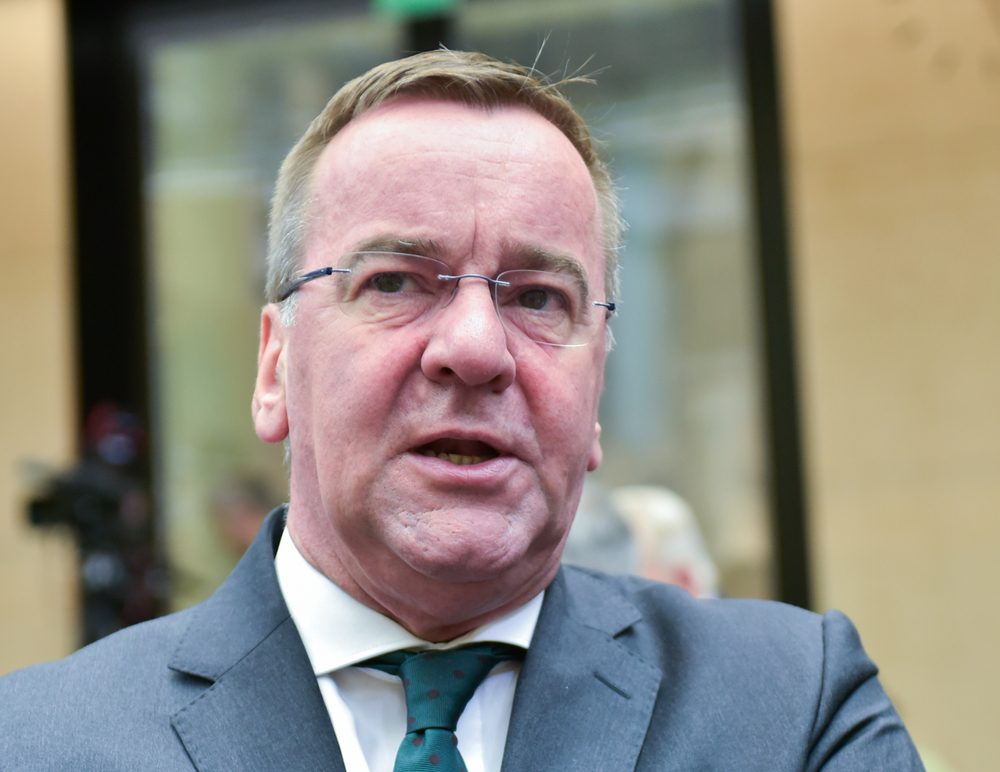
Boris Pistorius, 62, the current state interior minister in Lower Saxony, will succeed Christine Lambrecht as Germany’s defense minister, according to an announcement from the German federal office on Tuesday, January 17th.
The little-known Pistorius (SPD) served as interior minister since 2013 and before that, was mayor of Osnabrück.
In a statement, Chancellor Olaf Scholz (SDP) defended the unorthodox choice by praising Pistorius, who has been in politics since 1976, for his “experience, competence, perseverance and big heart.”
Ich freue mich, dass mit Boris #Pistorius ein herausragender Politiker unseres Landes neuer Verteidigungsminister wird. Mit seiner Erfahrung, Kompetenz und Durchsetzungsfähigkeit sowie seinem großen Herz ist er genau die richtige Person für die Bundeswehr in der #Zeitenwende.
— Bundeskanzler Olaf Scholz (@Bundeskanzler) January 17, 2023
With Pistorius’ appointment, Scholz abandoned his decision to select a cabinet composed of equal numbers of men and women. All three coalition partners have thus far resigned themselves to his deviation, but the New York Times reports that women within the chancellor’s own party wanted him to keep his commitment to the principle of a gender-balanced cabinet. It came as a surprise to some that Eva Högl (SPD), who as defense commissioner presumably would have the necessary qualifications, was not appointed.
Some in the opposition have reacted negatively to Pistorius’ remarkable elevation. Johann Wadephul, deputy leader of the CDU/CSU, called it a “surprise, but unfortunately not a good one.” According to Wadephul, Pistorius was drawn from the “B-team,” while stressing that given the situation, he did not have the luxury of 100 days of training.
"Der Nächste bitte – Schafft #Pistorius die #Zeitenwende?" Es ist eine große Aufgabe. @cducsubt bieten in jedem Fall konstruktive Zusammenarbeit an. Auch die Opposition hat ein Interesse, dass wir einen guten Minister haben. #phoenixrunde @phoenix_de pic.twitter.com/edNgQUSNho
— Johann Wadephul (@JoWadephul) January 17, 2023
Others proved more diplomatic. Finance Minister Christian Lindner (FDP) congratulated Pistorius on Twitter, wishing him success in implementing the additional €100 billion fund Scholz set aside for the armed forces last February.
Gratulation an meinen neuen Kabinettskollegen Boris Pistorius. Vor allem mit der Umsetzung des Sondervermögens liegt eine große Aufgabe vor uns – ich freue mich auf die gute Zusammenarbeit zwischen @BMF_Bund und @BMVg_Bundeswehr. CL
— Christian Lindner (@c_lindner) January 17, 2023
Pistorius was not even mentioned as a potential candidate to replace Lambrecht when, late last week, it was rumored she would step down after an ignominious 13-month term as defense minister.
According to German media, the reason for the appointment of Pistorius is that few want to risk their career for what is commonly understood to be a precarious government post. Frankfurter Allgemeine went as far as calling it an “ejector seat” and a “career killer” for whoever dares to occupy it.
The task set before Pistorius is sure to be a demanding one. Even though he views Germany as only indirectly involved in the Russo-Ukrainian war, the challenges will be far greater than in peacetime.
For one, Pistorius will need to navigate the German Defense Ministry—a labyrinthian and highly bureaucratic institution that employs over 265,000 people. His priorities are to implement the €100 billion special fund for the Bundeswehr, reform the procurement system—somewhat crucial, since there is an ammunition shortage, caused by German military aid to Ukraine, that needs addressing—and resolve the sorry state Germany’s military equipment is in, since it urgently needs maintenance.
Then there is the German weapons industry’s prestige project, the Puma. In development for years, it is known as the most expensive armored vehicle fielded by any army in the world. Yet during a series of exercises before the advent of last Christmas, eighteen out of eighteen vehicles broke down, requiring three weeks of repairs.
In addition, the Bundeswehr needs a structured plan for its withdrawal from Mali, scheduled to happen by May 2024. With the Sahel region remaining highly volatile because of various armed groups vying for control, German forces will be playing a role in a planned, three-year EU mission in neighboring Niger.
Pistorius is to take the oath on Thursday in the Bundestag and be officially appointed by Federal President Frank-Walter Steinmeier. The same day, U.S. Defense Secretary Lloyd Austin will arrive in Berlin to consult.
On Friday, January 20th, Pistorius is to gather his fellow defense ministers at a summit at the U.S. base Ramstein in Rhineland-Palatinate. The discussion is expected to be dominated by the delivery of German high-caliber Leopard 2 tanks to Ukraine. Without German government approval, no other country in current possession of these tanks can send them to Ukraine.
With a new Russian offensive on the horizon, pressure is therefore growing among Germany’s allies—and from German politicians, particularly in the Green Party—for Scholz and his new defense minister to bolster their commitment.
